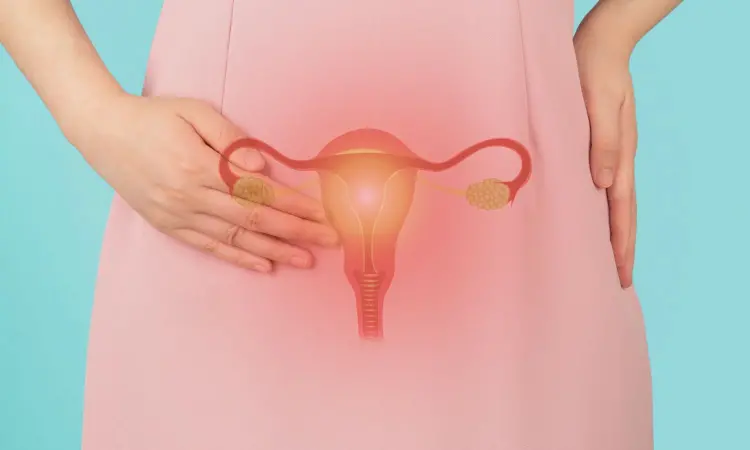- Home
- Medical news & Guidelines
- Anesthesiology
- Cardiology and CTVS
- Critical Care
- Dentistry
- Dermatology
- Diabetes and Endocrinology
- ENT
- Gastroenterology
- Medicine
- Nephrology
- Neurology
- Obstretics-Gynaecology
- Oncology
- Ophthalmology
- Orthopaedics
- Pediatrics-Neonatology
- Psychiatry
- Pulmonology
- Radiology
- Surgery
- Urology
- Laboratory Medicine
- Diet
- Nursing
- Paramedical
- Physiotherapy
- Health news
- Fact Check
- Bone Health Fact Check
- Brain Health Fact Check
- Cancer Related Fact Check
- Child Care Fact Check
- Dental and oral health fact check
- Diabetes and metabolic health fact check
- Diet and Nutrition Fact Check
- Eye and ENT Care Fact Check
- Fitness fact check
- Gut health fact check
- Heart health fact check
- Kidney health fact check
- Medical education fact check
- Men's health fact check
- Respiratory fact check
- Skin and hair care fact check
- Vaccine and Immunization fact check
- Women's health fact check
- AYUSH
- State News
- Andaman and Nicobar Islands
- Andhra Pradesh
- Arunachal Pradesh
- Assam
- Bihar
- Chandigarh
- Chattisgarh
- Dadra and Nagar Haveli
- Daman and Diu
- Delhi
- Goa
- Gujarat
- Haryana
- Himachal Pradesh
- Jammu & Kashmir
- Jharkhand
- Karnataka
- Kerala
- Ladakh
- Lakshadweep
- Madhya Pradesh
- Maharashtra
- Manipur
- Meghalaya
- Mizoram
- Nagaland
- Odisha
- Puducherry
- Punjab
- Rajasthan
- Sikkim
- Tamil Nadu
- Telangana
- Tripura
- Uttar Pradesh
- Uttrakhand
- West Bengal
- Medical Education
- Industry
Letrozole with FSH had similar pregnancy rates in obese and nonobese PCOS women, claims research

Obesity is considered as one of the most frequently observed risk factors for infertility in both males and females as well, as it interferes with the success of the treatment of fertility.
Higher body mass index is associated with infertility, especially ovulatory disorders. Obese women under treatment for infertility may face additional problems, such as the need for higher doses of drugs to induce/stimulate ovulation, oocyte morphological changes, reduction in fertilization and implantation rates, and embryo quality.
Letrozole and clomiphene citrate are commonly used drugs for ovulation induction with or without gonadotropins in anovulatory women especially polycystic ovarian syndrome. Letrozole, a short half-life aromatase inhibitor(45 hours), has shown more successful ovulation induction in polycystic ovarian syndrome (PCOS) patients.
In cases of poor follicular response, low doses of FSH are given as a cotherapy with letrozole to enhance follicular development and maturity. Letrozole cotreatment with gonadotropins was found to cause a higher incidence of monofollicular growth which is an advantage that reduces the risks of hyperstimulation effect of ovulation induction therapy. Letrozole was also used in unexplained infertility and found to be as effective as clomiphene citrate with reduced multiple births. However, a combination of letrozole and gonadotropins has not been studied extensively either in PCOS patients or unexplained infertility, in relation to obesity. Therefore, the goal of this study was to assess the success of ovulation induction with letrozole combined with FSH in obese and nonobese women. The main intention was to study the impact of obesity on fertility outcome, when FSH was used along with letrozole.
A retrospective descriptive cohort study was conducted involving 135 women who underwent OI with letrozole plus follicle stimulating hormone therapy and either timed intercourse or intrauterine insemination. The data was collected from the hospital information system, including the age, body mass index, the type of infertility, number of induction cycles with letrozole, number of gonadotropin injections, and the pregnancy occurrence following treatment. SPSS was used to analyze the data
There were 135 women who used FSH injections along with letrozole. Of this, 28.5% obese women got pregnant compared to 29.2% nonobese women, but this did not attain statistical significance (P = 0:75). About 70% of obese women and 57% on nonobese women had polycystic ovarian syndrome. The median number of FSH injections was six, and the interquartile range was 3 to 11.
Women with BMI 30 were more likely to conceive with letrozole and FSH. It is hypothesized that letrozole decreases the conversion of testosterone to estrogen peripherally, thus decreasing pituitary inhibition, and promotes normal secretion of gonadotropins. However, in view of obesity, these women needed more FSH. The dose of FSH injections did not differ significantly between obese and nonobese women in our study. According to Kaya et al., increased BMI was associated with the increase in FSH requirement and a longer period of ovarian stimulation that could result in follicle development. The number of follicles also did not differ significantly between the obese and nonobese women in this study.
In conclusion, in the small number of women authors studied, letrozole and FSH were equally effective and there was not a single woman with ovarian hyperstimulation.
Source: Vaidyanathan Gowri , 1 Arwa Al-Amri,2 Thikra Mohammed Abdulrahman Almamari; Hindawi International Journal of Reproductive Medicine Volume 2022, Article ID 1931716, 4 pageshttps://doi.org/10.1155/2022/1931716
MBBS, MD Obstetrics and Gynecology
Dr Nirali Kapoor has completed her MBBS from GMC Jamnagar and MD Obstetrics and Gynecology from AIIMS Rishikesh. She underwent training in trauma/emergency medicine non academic residency in AIIMS Delhi for an year after her MBBS. Post her MD, she has joined in a Multispeciality hospital in Amritsar. She is actively involved in cases concerning fetal medicine, infertility and minimal invasive procedures as well as research activities involved around the fields of interest.


